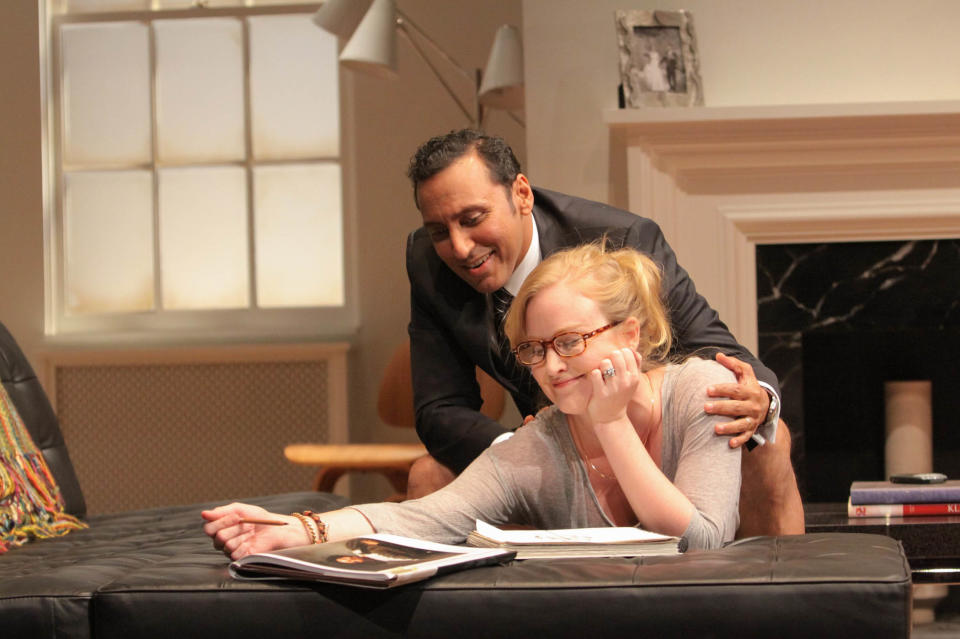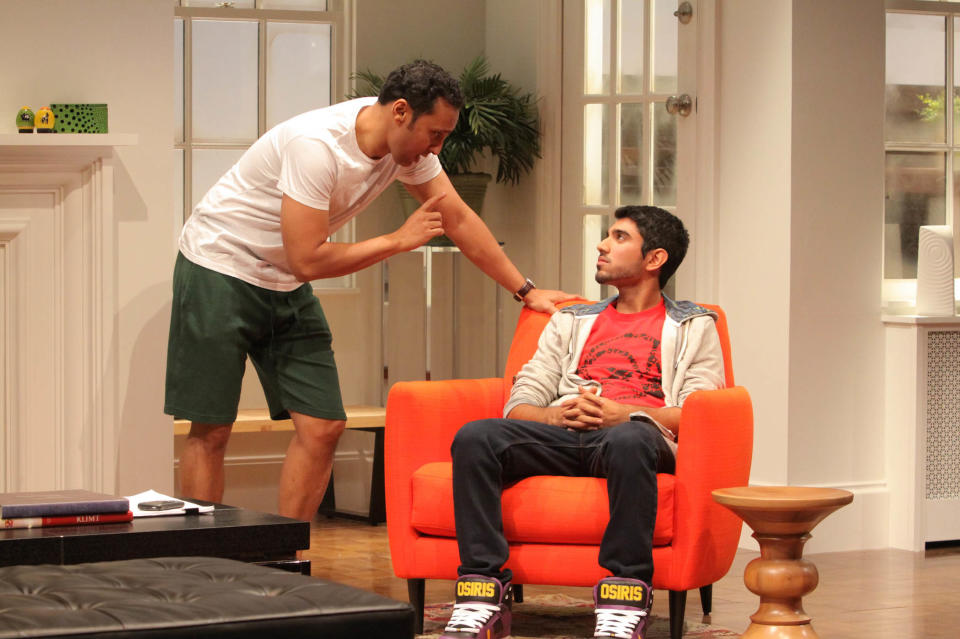Comic actor shows dramatic chops in 'Disgraced'
NEW YORK (AP) — It's an oft-used device in theater: The doomed dinner party, a gathering that starts out politely, with house gifts of wine or pastries and glasses clinking over civilized chatter, and ends up in horrific, angry chaos.
But when that party chatter touches on Islamic and Judaic tradition, the Quran and the Talmud, racial profiling and Sept. 11 and the Taliban and Mahmoud Ahmadinejad and Benjamin Netanyahu — along with the requisite alcohol intake — well, that's a whole other level of chaos.
And it all unfolds with speed, energy and crackling wit in "Disgraced," a terrific new play by the actor, novelist and playwright Ayad Akhtar.
Fans of Jon Stewart will have an extra motivation to head over to Lincoln Center's Claire Tow Theater — the new home of the LCT3 series, which promotes rising playwrights. The lead character, a Pakistani-American corporate lawyer in New York, is played by Aasif Mandvi, the very funny correspondent on Stewart's "The Daily Show." Here Mandvi shows a dramatic depth and perceptiveness his TV fans likely never have seen before. (But he's not new to the stage; he's also the writer of the Obie Award-winning play "Sakina's Restaurant.")
Mandvi plays Amir Kapoor, a Manhattan yuppie if ever there was one. He and his wife, Emily, live on the Upper East Side in an apartment vividly described in the script as "spare and tasteful with subtle flourishes of the Orient." Manhattanites in the audience will salivate at the sight of a terrace, however small, off the living room.
Amir loves the Knicks and the Magnolia Bakery and his elegant $600 shirts with their "ridiculous thread count." He's not a partner yet, but he sees himself as on the rise at his law firm, Leibowitz, Bernstein and Harris — he even fantasizes about the name "Kapoor" added at the end.
On the surface, Amir has no desire to honor or even recall his roots. A Muslim by birth, he has rejected his religion. Aware of stereotypes in post-9/11 America, he finds it better to have his law firm think his father was born in India, not Pakistan — technically, that was true, he says, given that it was in 1946.
But there's a deeper connection, a loyalty he doesn't acknowledge, and the troubles begin when his nephew asks him to help the legal case of a jailed imam. His wife, an artist who dabbles in Islamic themes, can't see why he wouldn't. He reluctantly pitches in, only to be quoted in the paper as defending the imam — which infuriates his Jewish bosses and threatens his job.
So Amir is already seething when the dinner party in question begins. The party brings together two couples and several religious and ethnic identities. Jory, the African-American lawyer and co-worker who, like Amir, aspires to be partner, is married to Isaac, a Jewish curator at the Whitney Museum with an exhibit that Emily desperately hopes to be a part of.
The evening will come to a shocking end, but before that, there is the sparkling conversation, expertly rendered on the page by Akhtar — who wrote the novel "American Dervish," and also co-wrote and played the lead in the film "The War Within" — and on the stage by director Kimberly Senior.
Every exchange, however innocent, seems to reflect the uneasy state of Amir's identity. He and Emily are serving pork tenderloin and chorizo for dinner, along with a fabulous fennel-anchovy salad. He disses Islam while Isaac defends it. Amir: "Islam is a backward way of thinking." Isaac: "It happens to be one of the world's great spiritual traditions."
But then there's a sudden turn. Talk of 9/11, of Israel and Iran, of terrorism and airport security, all evokes uncomfortable truths. Add a liberal flow of alcohol and a couple of major secrets suddenly revealed, and you've got yourself one dangerous dinner party.
The acting, in addition to the impressive Mandvi, is uniformly accomplished, from Heidi Armbruster as the appealing but naive Emily, to Erik Jensen and Karen Pittman as the dinner guests, to a wonderfully natural Omar Maskati as Amir's young nephew, who has changed his name from Hussein to Abe in the name of assimilation.
In the end, one can debate what the message of the play really is. Is it that we cannot escape our roots, or perhaps simply that we don't ever really know who we are, deep down, until something forces us to confront it?
Whatever it is, when you finally hear the word "disgraced" in the words of one of these characters, you will no doubt feel a chill down your spine.
Not to mention the next time you see a fennel-anchovy salad.
___
Online: http://www.lct.org



